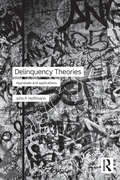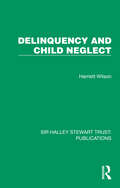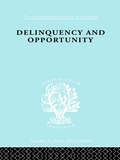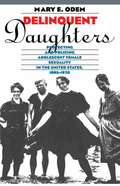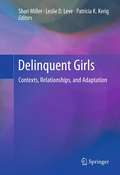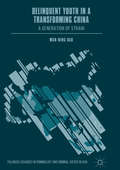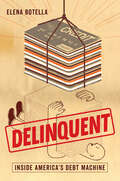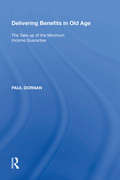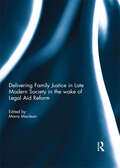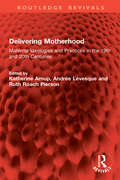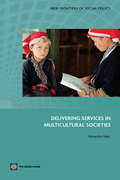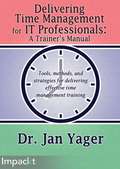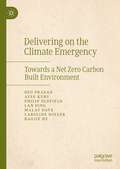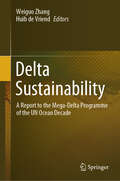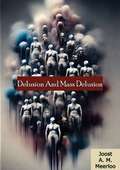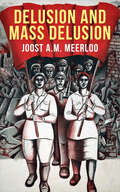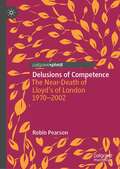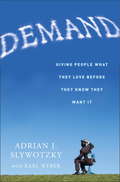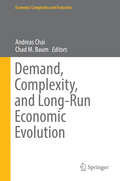- Table View
- List View
Delinquency Theories: Appraisals and applications
by John P. HoffmannDelinquency Theories: Appraisals and applications provides a fulsome and accessible overview of contemporary theories of juvenile delinquency. The book opens with a comprehensive description of what a theory is, and explains how theories are created in the social sciences. Following on, each subsequent chapter is dedicated to describing an individual theory, broken down and illustrated within four distinct sections. Initially, each chapter tells the tale of a delinquent youth, and from this example a thorough review of the particular theory and related research can be undertaken to explain the youth’s delinquent behaviour. The third and fourth sections of each chapter critically analyze the theories, and provide a straightforward discussion of policy implications of each, thus encouraging readers to evaluate the usefulness of these theories and also to consider the relationship between theory and policy. This text is an invaluable resource for both undergraduate and graduate students of subjects such as youth justice, delinquency, social theory, and criminology.
Delinquency and Child Neglect (Sir Halley Stewart Trust: Publications)
by Harriett WilsonOriginally published in 1962, this was the first comprehensive study of a group of families often referred to as ‘problem families’. Harriett Wilson shows that they are not a homogenous group, and furthermore, that they do not possess any unique personality traits. On the contrary, the disabilities which are found among the families who took part in this investigation are also found in the general run of the population. The main disabling factor turned out to be the social isolation to which these families are subjected.This isolation affects not only the personality of father and mother, but it also has a profound effect on the character formation of their children, who tend to become delinquent. The child from this environment has not learnt to control their impulses effectively enough to take part in social life on a normal basis. They are handicapped from an early age.Harriett Wilson concludes that the delinquency found in this environment is a symptom of a total family situation which can only be treated at the family level by preventative family services. Today it can be read and enjoyed in its historical context.This book is a re-issue originally published in 1962. The language used and views portrayed are a reflection of its era and no offence is meant by the Publishers to any reader by this re-publication.
Delinquency and Opportunity: A Study of Delinquent Gangs (International Library of Sociology)
by Richard A. Cloward L.E. OhlinFirst published in 1998. Routledge is an imprint of Taylor & Francis, an informa company.
Delinquent Daughters: Protecting and Policing Adolescent Female Sexuality in the United States, 1885-1920
by Mary E. OdemDelinquent Daughters explores the gender, class, and racial tensions that fueled campaigns to control female sexuality in late nineteenth- and early twentieth-century America. Mary Odem looks at these moral reform movements from a national perspective, explores the local enforcement of regulatory legislation in Alameda and Los Angeles Counties in California and shows that the paradoxical consequences of reform often resulted in coercive and discriminatory policies toward working-class girls.
Delinquent Girls
by Leslie D. Leve Shari Miller Patricia K. KerigTraditionally, delinquent girls were considered an anomaly, a rare phenomenon attracting little scholarly notice. Today, more than one in four youth offenders is female, and researchers and practitioners alike are quickly turning their attention and resources to address this challenging situation. Delinquent Girls: Contexts, Relationships, and Adaptation synthesizes what is known about girls involved in delinquent behavior and their experiences at different points in the juvenile justice system. This breakthrough volume adds to the understanding of this population by offering empirical analysis not only of how these behaviors develop but also about what is being done to intervene. Employing multiple theoretical models, qualitative and quantitative data sources, law enforcement records, and insights across disciplines, leading scholars review causes and correlates; the roles of family and peers; psychological and legal issues; policy changes resulting in more arrests of young women; and evidence-based prevention and intervention strategies. Each chapter covers its subject in depth, providing theory, findings, and future directions. Important topics addressed include: Narrowing the gender gap - trends in girls' delinquency.Girls at the intersection of juvenile justice, criminal justice, and child welfare.Trauma exposure, mental health issues, and girls' delinquency.Beyond the stereotypes: girls in gangs.Intervention programs for at-risk and court-involved girls.Implications for practice and policy.With its broad scope and solution-oriented focus, Delinquent Girls: Contexts, Relationships, and Adaptation is a must-have volume for researchers, professionals, graduate students, and social policy experts in clinical child and school psychology, social work, juvenile justice, criminology, developmental psychology, and sociology.
Delinquent Youth in a Transforming China
by Wan-Ning BaoThis book explores two major social problems facing Chinese society today: increased strain in the lives of young people and heightened rates of crime and delinquency, ultimately examining the links between them. More broadly, it draws on Bronfenbrenner's ecological systems theory and Agnew's general strain theory to examine the factors and processes affecting young people, leading to life strain and delinquency. It represents the first study of this kind and involves the most systematic and comprehensive literature review of studies on major social, economic, political and cultural changes, as well as youth crime in contemporary China. Bao's arguments are supported by empirical evidence including data findings and over a decade's worth of observational research. Shedding new light on the nature of youth crime in a rapidly changing society, this methodical study will benefit policy makers and researchers, helping them to develop tactics and methods to reduce strain in the lives of young people, and thus effectively prevent delinquency in China.
Delinquent: Inside America's Debt Machine
by Elena BotellaA consumer credit industry insider-turned-outsider explains how banks lure Americans deep into debt, and how to break the cycle. Delinquent takes readers on a journey from Capital One’s headquarters to street corners in Detroit, kitchen tables in Sacramento, and other places where debt affects people's everyday lives. Uncovering the true costs of consumer credit to American families in addition to the benefits, investigative journalist Elena Botella—formerly an industry insider who helped set credit policy at Capital One—reveals the underhanded and often predatory ways that banks induce American borrowers into debt they can’t pay back. Combining Botella’s insights from the banking industry, quantitative data, and research findings as well as personal stories from interviews with indebted families around the country, Delinquent provides a relatable and humane entry into understanding debt. Botella exposes the ways that bank marketing, product design, and customer management strategies exploit our common weaknesses and fantasies in how we think about money, and she also demonstrates why competition between banks has failed to make life better for Americans in debt. Delinquent asks: How can we make credit available to those who need it, responsibly and without causing harm? Looking to the future, Botella presents a thorough and incisive plan for reckoning with and reforming the industry.
Delirious Naples: A Cultural History of the City of the Sun
by Pellegrino D’Acierno and Stanislao G. PuglieseThis book is addressed to “lovers of paradoxes” and we have done our utmost to assemble a stellar cast of Neapolitan and American scholars, intellectuals, and artists/writers who are strong and open-minded enough to wrestle with and illuminate the paradoxes through which Naples presents itself. Naples is a mysterious metropolis. Difficult to understand, it is an enigma to outsiders, and also to the Neapolitans themselves. Its very impenetrableness is what makes it so deliriously and irresistibly attractive. The essays attempt to give some hints to the answer of the enigma, without parsing it into neat scholastic formulas. In doing this, the book will be an important means of opening Naples to students, scholars and members of the community at large who are engaged in “identity-work.” A primary goal has been to establish a dialogue with leading Neapolitan intellectuals and artists, and, ultimately, ensure that the “deliriously Neapolitan” dance continues.
Delivering Benefits in Old Age: The Take up of the Minimum Income Guarantee (Studies In Cash And Care Ser.)
by Paul DornanAlthough means-testing for Social Security transfers is economical, it hasn't proven to be very effective. The Minimum Income Guarantee (MIG) and the Pension Credit initiatives implemented by the Labour Government in the UK have both suffered from low levels of take up amongst entitled pensioners. This book sheds important new light on this pressing problem, examining existing research on take-up and highlighting gaps in understanding. It explores the strengths and weaknesses of the theoretical base, drawing on European theory and applying it to the UK. Socio-economic, demographic and attitudinal trends are analyzed to elucidate the impact they have had, and will have, on the proportion entitled to MIG and its take-up rate. Current policy is also analyzed to explore the importance of take-up for the Labour government and the prospects of improving it. As high take-up would be an important step in combating poverty, this book offers solutions and options to tackle these problems. It is therefore of critical interest to academics and policy makers in the UK and around the world.
Delivering Family Justice in Late Modern Society in the wake of Legal Aid Reform
by Mavis MacleanLegal aid for family cases in private law, mainly divorce and separation, where the state is not directly involved as it is in public law cases where there are issues of domestic violence or neglect or abuse of children, came to an abrupt end together with help for welfare and immigration cases on April 1 2013 when the Legal Aid Sentencing and Punishment of Offenders Act (LASPO) came into effect. This book presents an account of the wide ranging problems which the researchers and practitioners expected to ensue. Sadly, their fears have been realised in many areas of legal help and advice. The National Audit Office was to take the view in 2014 that although the Ministry of Justice had succeeded in making considerable savings in the cause of austerity that they had failed to investigate or understand the impact of these cuts on the individuals concerned and society as a whole. This book was previously published as a special issue of the Journal of Social Welfare and Family Law.
Delivering Fantastic Customer Experience: How to Turn Customer Satisfaction Into Customer Relationships
by Daniel LafrenièreIf you don’t offer great customer experience, your main competitors will take away 50% of your business. Period. Gone are the days in which businesses could simply offer an "OK" experience and get away with it. In today’s hypercompetitive environment, companies can no longer be just B2C or B2B. They must become B2Me – more personal, more relevant. With customers having higher expectations and access to more information than ever before, companies must create stellar, frictionless, personalized, and memorable customer experiences, if they plan to stay in the game. In this book, you will learn: • What customer experience truly is. • How emotions can increase customer loyalty…or make customers ditch a brand. • Which behaviors and attitudes lose customers. • Ten easy, practical, and proven ways to immediately improve your customer experience. • What renowned companies do to offer the best customer experience. This book is for anyone who works serving customers in a B2C company or other businesses in a B2B environment. Everyone has an important role to play in creating a good customer experience, whether it be managers, associates, sales reps, marketing professionals, web strategists, accountants, customer service reps, delivery people, or installers. No matter what role you play, this book offers easy tips, recommendations, and examples to help improve customer experience, realistically, sustainably, and affordably.
Delivering Motherhood: Maternal Ideologies and Practices in the 19th and 20th Centuries (Routledge Revivals)
by Ruth Roach Pierson Katherine Arnup Andrée LévesqueIn the course of the nineteenth and twentieth centuries, motherhood in Canada, as elsewhere in the western world, became contested terrain. Male medical practitioners vied with midwives, and midwives with nurses, while reform-minded middle-class women joined with the eugenically minded state officials in efforts to control the quantity and quality of the population. As reproduction gained in importance as a political as well as a religious issue, motherhood became the centre of debate over public health and welfare policies and formed the cornerstone of feminist and anti-feminist, as well as nationalist and pacifist ideologies.Originally published in 1990, Delivering Motherhood (now with a new preface by Katherine Arnup) is the first comprehensive study on the history of this complex development in Canada, where control over the different stages of reproduction, from conception, to delivery, to childcare, shifted from the central figure of the mother to experts and professionals. The contributions range from the treatment of single mothers in Montreal in the Depression to La Leche League in the 1960s, 70s, and 80s.This book will be an essential read for students and researchers of women’s studies, feminist studies, women’s history, and sociology.
Delivering Services in Multicultural Societies
by Alexandre MarcOver the last two decades the world has witnessed an important transformation of the concept of citizenship and social integration, increasingly recognizing that cultural and ethnic diversity need to be considered when designing and implementing social policies. The increasing cultural diversity of societies, along with the important role culture plays in forming identities in these societies, creates major challenges for national and local governments in ensuring social cohesion and social inclusion. 'Delivering Services in Multicultural Societies' reviews recent approaches to recognizing cultural diversity when delivering basic services. It first discusses how supporting cultural diversity can help achieve social inclusion and social cohesion. It then considers the debate over multiculturalism from various perspectives and discusses the risks and benefits of policies that support cultural diversity. Also examined are policies and programs that support cultural diversity in the delivery of basic services, such as education, health care, customary law, traditional governance systems, and cultural services. For each of these services the author reviews main challenges and describes best practices. Finally, the book offers a synthesis of what has been learned about taking cultural diversity into account in service delivery.
Delivering Time Management for IT Professionals: A Trainer's Manual
by Dr Jan YagerIf you want to create an efficient and high performing team, use this book to help your employees develop strong time management skills that will bring personal and team success.
Delivering on the Climate Emergency: Towards a Net Zero Carbon Built Environment
by Philip Oldfield Deo Prasad Aysu Kuru Lan Ding Malay Dave Caroline Noller Baojie HeThis book focuses on the transition towards net-zero carbon built environments to deliver on the climate emergency. It provides an evidence-based roadmap and proposes guidelines to achieving targets covering emerging technologies, materials, innovative design, regulations and policies.
Delta Sustainability: A Report to the Mega-Delta Programme of the UN Ocean Decade
by Huib De Vriend Weiguo ZhangThis book examines sustainability issues of 15 deltas in the world. Each delta is described in five sections: physical setting, socioeconomic characteristics, current issues, management measures and perspective for future pathways to greater sustainability. These deltas, diverse in their geographical and economic conditions, are all confronted with natural hazards and pollution issues, posing threats to ecological health, human security and economic development. The book offers an overview of delta challenges in an integrated natural and social science approach. It is intended for researchers, graduate students and the public, especially those dwelling in deltas. It aims to improve knowledge of the current situation and to enhance awareness of the urgency of collective action to prepare for the uncertain future of these deltas. Possible future pathways towards delta sustainability are also addressed in the book.
Delta Theory and Psychosocial Systems
by Roland G. TharpDelta Theory establishes the foundation for a true scientific applied psychology, a theory of how human influence induces change in others. Delta Theory is unified and universal, applying to all cultures, historical periods and goals for change. It integrates concepts and research from psychology, sociology, anthropology, evolution theory, philosophy, psychoneurology, cognitive science and cultural-historical-activity theory. Yet Delta Theory is clear, economical and elegant, with a full exposition of tactics for its practices. Rich examples are drawn from professional practices, but also from the creation and operations of criminals, healing ceremonies of indigenous peoples, and cross-species comparisons. This book ultimately seeks to describe how influence works, how it could be improved and how it can be resisted.
Delusion And Mass Delusion
by Joost A. M. MeerlooJoost A. M. Meerloo’s Delusion and Mass Delusion is a thought-provoking exploration of the psychological mechanisms behind individual and collective beliefs, shedding light on how illusions and ideologies take root and spread in societies. Drawing on his background in psychiatry and psychology, Meerloo examines the ways in which delusions, both personal and societal, shape behavior and influence history.The book delves into the nature of delusion, exploring its origins in the human mind and its role in shaping perceptions of reality. Meerloo analyzes how factors like fear, propaganda, group dynamics, and emotional manipulation contribute to the creation and perpetuation of mass delusions. Through case studies and historical examples, he illustrates how entire populations can be swayed by charismatic leaders, political ideologies, and cultural myths, often with devastating consequences.Meerloo also examines the psychological vulnerabilities that make individuals and groups susceptible to delusions, as well as the ethical and societal implications of these phenomena. His insights provide a valuable framework for understanding the psychological underpinnings of mass movements, cults, and propaganda, offering a cautionary tale about the power of suggestion and the fragility of critical thinking.Delusion and Mass Delusion is an essential read for anyone interested in psychology, sociology, or the dynamics of social influence. Meerloo’s clear and incisive writing makes complex concepts accessible, providing readers with tools to recognize and resist the forces that shape mass behavior. This book remains as relevant today as when it was first written, offering timeless insights into the human condition.
Delusion and Mass Delusion
by Joost A.M. MeerlooIn this classic of political and social psychology, Joost Meerloo attempts to account for the mechanisms of mind that have made the brainwashing techniques of totalitarian states so historically successful. His frightening conclusion, that "hardly anyone can resist," appeals to mechanisms undergirding human thought, many of which are not obviously available to individuals.
Delusions of Competence: The Near-Death of Lloyd’s of London 1970--2002 (Palgrave Studies in Economic History)
by Robin PearsonThis book examines the crisis at the famous insurance market, Lloyd's of London, during the late twentieth century, which nearly destroyed the 300-year-old institution. While rapid structural change resulting from system collapse is less common in insurance than in the history of other financial services, one exception was the Lloyd’s crisis. Hitherto, explanations of the crisis have focused on the effects of catastrophic losses and poor governance. By drawing on contemporary accounts of the crisis, the author constructs the first comprehensive scholarly analysis of the public and political response. The book applies theoretical concepts from behavioural economics and economic psychology to argue that multiple delusions of competence were at work both within and outside the Lloyd’s market. Arrogance, elitism and defence of vested interests comprised endogenous elements of the crisis. Entrenched ideas about the virtues of self-regulation and faith in insider experts also played a role. The result was a misdiagnosis by both insiders and politicians of what ailed Lloyd’s and a series of reforms that failed to address the underlying causes of its disease. This book offers a salutary lesson from recent history about the importance of the transparency, accountability and effective monitoring of financial institutions. It is of interest to academics and students of economic and financial history, business, insurance, political economy and history.
Demand
by Karl Weber Adrian SlywotzkyIn DEMAND: Giving People What They Love Before They Know They Want It (Crown Business; October 2011), Adrian Slywotzky, named by Industry Week one of the world's six most influential management thinkers, provides a radically new way to think about demand, with a big idea and a host of practical applications--not just for people in business but also for social activists, governments leaders, non-profit managers, and other would-be innovators. They all need to master such ground-breaking concepts as the hassle map (and the secrets of fixing it); the curse of the incomplete product (and how to avoid it); why very good != magnetic; how what you don't see can make or break a product; the art of transforming fence sitters into customers; why there's no such thing as an average customer; and why real demand comes from a 45-degree angle of improvement (rather than the five degrees most organizations manage).From the Hardcover edition.
Demand for EU Polity Building in the Shadow of the Russian Threat (Elements in European Politics)
by Ioana-Elena Oana Alexandru D. Moise Zbigniew TruchlewskiThe Russian invasion of Ukraine came on the heels of a series of crises that tested the resilience of the EU as a compound polity and arguably reshaped European policymaking at all levels. This Element investigates the effects of the invasion on public support for European polity building across four key policy domains: refugee policy, energy policy, foreign policy, and defence. It shows how support varies across four polity types (centralized, decentralized, pooled, reinsurance) stemming from a distinction between policy and polity support. In terms of the drivers of support and its evolution over time, performance evaluations and ideational factors appear as strong predictors, while perceived threat and economic vulnerability appear to matter less. Results show strong support for further resource pooling at the EU level in all domains that can lead to novel and differentiated forms of polity-building. This title is also available as Open Access on Cambridge Core.
Demand, Complexity, and Long-Run Economic Evolution (Economic Complexity and Evolution)
by Andreas Chai Chad M. BaumThe purpose of this contributed volume is to consider how global consumption patterns will develop in the next few decades, and what the consequences of that development will be for the economy, policymakers, and society at large. In the long run, the extent to which economic growth translates into better living conditions strongly depends on how rising affluence and new technologies shape consumer preferences. The ongoing rise in household income in developing countries raises some important questions: Will consumption patterns always continue to expand in the same manner as we have witnessed in the previous two centuries? If not, how might things evolve differently? And what implications would such changes hold for not only our understanding of consumption behavior but also our pursuit of more sustainable societies?
Demanding Child Care: Women's Activism and the Politics of Welfare, 1940-1971
by Natalie M. FousekisDuring World War II, as women stepped in to fill jobs vacated by men in the armed services, the federal government established public child care centers in local communities for the first time. When the government announced plans to withdraw funding and terminate its child care services at the end of the war, women in California protested and lobbied to keep their centers open, even as these services rapidly vanished in other states. Analyzing the informal networks of cross-class and cross-race reformers, policymakers, and educators, Demanding Child Care: Women's Activism and the Politics of Welfare, 1940-1971 traces the rapidly changing alliances among these groups. During the early stages of the childcare movement, feminists, Communists, and labor activists banded together, only to have these alliances dissolve by the 1950s as the movement welcomed new leadership composed of working-class mothers and early childhood educators. In the 1960s, when federal policymakers earmarked child care funds for children of women on welfare and children described as culturally deprived, it expanded child care services available to these groups but eventually eliminated public child care for the working poor. Deftly exploring the possibilities for partnership as well as the limitations among these key parties, Fousekis helps to explain the barriers to a publically funded comprehensive child care program in the United States.
Demanding Energy: Space, Time and Change
by Gordon Walker Allison Hui Rosie DayThis edited collection critically engages with an important but rarely-asked question: what is energy for? This starting point foregrounds the diverse social processes implicated in the making of energy demand and how these change over time to shape the past patterns, present dynamics and future trajectories of energy use. Through a series of innovative case studies, the book explores how energy demand is embedded in shared practices and activities within society, such as going to music festivals, cooking food, travelling for business or leisure and working in hospitals. Demanding Energy investigates the dynamics of energy demand in organisations and everyday life, and demonstrates how an understanding of spatiality and temporality is crucial for grasping the relationship between energy demand and everyday practices. This collection will be of interest to researchers and students in the fields of energy, climate change, transport, sustainability and sociologies and geographies of consumption and environment. Chapters 1 and 15 of this book are available open access under a CC BY 4.0 license at link.springer.com
